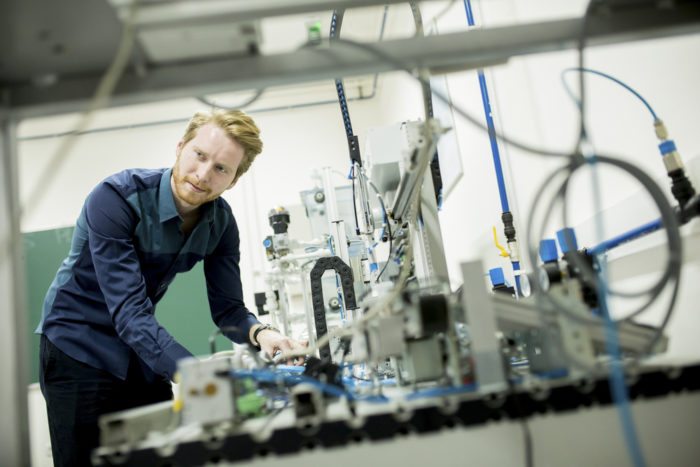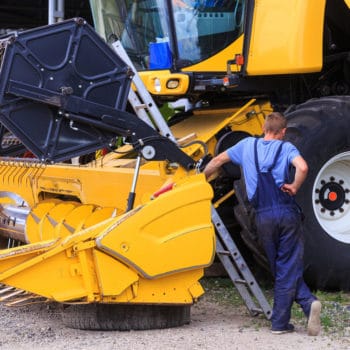Why We Love It
-
$56,670Potential Avg. Salary
-
Flexible HoursCareer Attribute
-
Growing IndustryCareer Attribute
-
Skill-Based WorkCareer Attribute
Industrial robotics mechanics maintain, troubleshoot, and repair robots used in the manufacturing industry. In manufacturing, robots are used to perform rote and/or dangerous tasks that are unappealing to human workers, and industrial robotics mechanics keep these robots in working order.
Recommended Schools
What is an Industrial Robotics Mechanic?
The following job responsibilities are common for individuals in industrial robotics mechanic roles:
- Troubleshoot and repair malfunctioning robotics equipment
- Install newly received robots in manufacturing facilities and factories
- Calibrate software to train robots how to perform their tasks
- Perform thorough testing on robots to ensure they’re defect-free and working as designed
A Day in the Life
In manufacturing, robots are used to perform tasks that are either too boring and repetitive for human workers, or too unsafe. They assist with assembly line production, performing tasks that enable production of products or goods. For example, industrial robots may perform tasks like welding or tightening bolts for new automobiles built in an automotive plant. Industrial robotics mechanics troubleshoot, maintain, and repair these robots to ensure they’re performing tasks as designed.
When new robots first arrive at a facility, the industrial robotics mechanic is in charge of installing the robot on the floor. In some cases, installing the robot may be as simple as running a variety of tests to ensure it is working properly and performing its role to specifications. However, some more advanced robots that use artificial intelligence technology may need to be trained to perform their roles, and the mechanic conducts this training by calibrating the robot’s software.
Manufacturing companies that depend on robots for production are highly dependent on the industrial robotics mechanics that service robots. Mechanics must be on hand at all times while production is occurring to ensure that all robots are performing correctly, and to halt production when required for repairs. Because a malfunctioning robot can create tremendous waste, the skills of robotics mechanics are critical for helping businesses ensure robots are helping to increase productivity and reduce costs.
Typical Work Schedule
The majority of industrial robotics mechanic roles are full-time, though the hours worked may vary greatly by employer. Some industrial robotics mechanics may work normal business hours, but for others, evening, overnight, weekend, and holiday work may be required. Robots require mechanics on hand for all production, so facilities that operate around the clock and year-round need mechanics to work all shifts.
Projected Job Growth
As robotics technology advances and become more commonplace, the number of businesses who adopt the technology should increase significantly. Increased adoption of robotics technology is expected to create an increased demand for industrial robotics mechanics in the coming decade.
Typical Employers
Most industrial robotics mechanics work in the manufacturing industry, installing, troubleshooting, and repairing the robots used in factories and other production facilities.
Recommended Schools
How To Become an Industrial Robotics Mechanic
In some cases, industrial robotics mechanics may be able to find work in the field with only a high school diploma. However, these mechanics are usually only able to find entry-level work, and some relevant professional experience is typically a prerequisite. While employers will conduct on-the-job training, they’ll expect recruits to have some working knowledge of robotics technologies. For this reason, most aspiring industrial robotics mechanics choose to pursue a degree before seeking employment.
Popular degrees for aspiring industrial robotics mechanics include associate’s degrees in mechanical or electrical engineering technology. These degree programs introduce students to the tools, techniques, and components used in industrial robotics engineering, and prepare students to build, troubleshoot, and repair robots professionally. Students will learn how to troubleshoot and repair common components like hydraulics, servo motors, wiring harnesses, and printed circuit boards.
With an associate’s degree, aspiring industrial robotics mechanics should be able to secure entry-level positions in the field. Mechanics commonly begin their careers working under an experienced technician, and—if successful—can move into higher-paying positions after earning some experience. Some industrial robotics mechanics also choose to pursue bachelor’s degrees in engineering later in their careers to move into robotics engineer roles where they can design new types of industrial robots.
Industrial Robotics Mechanic Salary Data
We’ve provided you the following to learn more about this career. The salary and growth data on this page comes from recently published Bureau of Labor Statistics data while the recommendations and editorial content are based on our research.
National Anual Salary
Low Range
$44,400Average
$56,670High Range
$79,030National Hourly Wage
Low Range
$21/hrAverage
$27/hrHigh Range
$38/hrHow do Industrial Robotics Mechanic salaries stack up to other jobs across the country? Based on the latest jobs data nationwide, Industrial Robotics Mechanic's can make an average annual salary of $56,670, or $27 per hour. This makes it an Above Average Salary. On the lower end, they can make $44,400 or $21 per hour, perhaps when just starting out or based on the state you live in.
Salary Rankings And Facts
#306 Nationally for All Careers
Programs and Degrees
Here are the most common degrees for becoming an Industrial Robotics Mechanic. a is usually recommended and specifically a degree or coursework that prepares you for the particular field, see below.
Highest Education Among Industrial Robotics Mechanics
- 0% Doctorate
- 0.6% Masters
- 9% Bachelors
- 21.7% Associates
- 35.1% College
- 32% High School
- 1.6% Less than High School
Job Growth Projections and Forecast
2014 Total Jobs
67,8002024 Est. Jobs
67,800Job Growth Rate
---Est. New Jobs
---How does Industrial Robotics Mechanic job growth stack up to other jobs across the country? By 2024, there will be a change of --- jobs for a total of 67,800 people employed in the career nationwide. This is a --- change in growth over the next ten years, giving the career a growth rate nationwide of Below Average.
Growth Rankings And Facts
#594 Nationally for All Careers
What Companies Employ The Most Industrial Robotics Mechanics
| Industry | Current Jobs | New Jobs Needed | % Increase |
|---|---|---|---|
| Federal government, excluding postal service | 10,000 | -900 | -1% |
| Electronic and precision equipment repair and maintenance | 3,800 | 100 | 0% |
| Electrical contractors and other wiring installation contractors | 3,300 | --- | --- |









